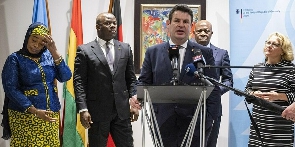 Hubertus Heil is German Minister for Employment and Social Policies
Hubertus Heil is German Minister for Employment and Social Policies
With remittances reaching an estimated 6.4 percent of Ghana gross domestic product (GDP) in 2022, the German Minister for Employment and Social Policies, Hubertus Heil, has called for the institutionalisation of fair migration policies and practices to grow this stream of income to cushion the economy.
With the right policies, he said, remittances could become a vital source of the foreign exchange for Ghana, particularly in providing crucial support amid the current economic downturn while creating a win-win proposition for all parties.
Explaining further, Mr. Heil – who spoke during a media engagement in Accra – emphasised that fair migration policies will not only lead to growth in inflow of remittances, but are also important in curtailing brain-drain, loss of human capital in the process of accessing illegal routes and the inhumane treatment some irregular migrants go through in foreign destinations.
“Fair migration is a sensitive issue because it involves brain-drain issues, but when properly and legally done it produces win-win results because the foreign country benefits from the human resources and the native country gets legitimate remittances in the process,” he said.
As the second-largest bilateral trade partner of Ghana, he said, his country is seeking collaborations to develop policies and find workable solutions to enhance fair migration that promotes development in a win-win situation.
On his part, Director-General of the International Labour Organisation (ILO), Gilbert F. Houngbo – who is on a working visit to Accra, touched on issues in the world of work; specifically child labour and trafficking challenges in the agriculture and fisheries sectors.
He called for the creation of a right balance through strategic social dialogues between the German government, Ghana and Côte d’Ivoire. He also emphasised the need for tripartite partnerships between government, social partners and other development partners on key decent work areas and policies.
“Developing and strengthening our supply chains of production in the food and agriculture space is important. We need a workable action plan to deal with, for instance, the cocoa supply chain sector as a core cash crop controlled by Ghana and Ivory Coast.
“We need these supply chains to move our people out of poverty and create sustainable livelihoods for them,” he said.
Commenting on fair migration, he iterated that Ghana over the years has had strong diaspora relations and been one of the top-earners of remittances; and therefore it is important to sanitise that space to create more win-win opportunities.
The Minister for Lands and Natural Resources, Samuel Abu Jinapor, on his part expressed support for the call to collaborate in developing ethical guidelines which would guide migration and labour relations.
He reiterated the efforts government has made in creating an enabling environment, guided by the principles of rule of law and democratic practices.
“We are ready to collaborate with the German government as a long-standing trade partner, and the ILO, so that the issues of corporate due diligence, sustainable supply chains, traceability and private sector respect for human rights can be ensured.
“The issue of developing our value chains as well is very important, because it is a tool for creating a sustainable global supply chain,” he said.
The Minister for Gender, Children, and Social Protection, Hajia Lariba Abudu, also disclosed government’s commitment to curbing the child labour and trafficking menace, adding that 21 persons are currently facing prosecution for violation of child labour and trafficking provisions.
The press engagement was hosted by the German Ambassador.